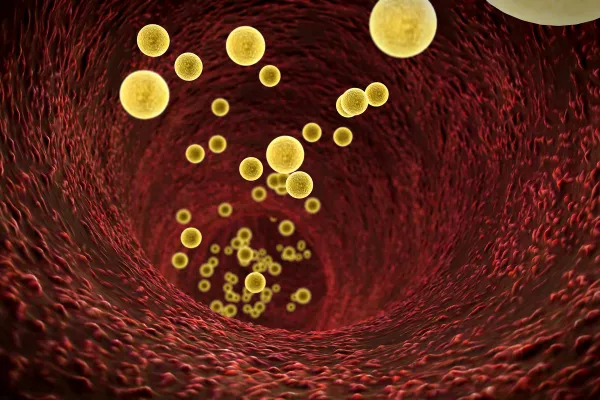Hey...

What's The Real Root Cause of High Cholesterol?
In a world obsessed with quick fixes and fad diets, the topic of high cholesterol has become a battleground of myths and misinformation. As a registered nutritionist specialising in female weight loss over 40, I've had the privilege of working with women, guiding them towards sustainable, sensible weight loss, and helping to lower cholesterol naturally in the process.
In this blog post, we're going to take a look into what really causes high cholesterol and debunk some prevalent myths.
The Complex Nature of High Cholesterol:
Cholesterol is a fatty substance found in every cell of your body, and it plays a crucial role in various bodily functions, including the production of hormones and cell membranes. Cholesterol itself is not the villain; it's the imbalances and underlying factors that lead to high cholesterol that we need to address.
1. Thyroid Function: An under-active thyroid can lead to elevated cholesterol levels. When your thyroid isn't functioning optimally, your body's metabolic processes slow down, which can lead to imbalances in cholesterol production.
2. Inflammation: Chronic inflammation in the body can trigger the liver to produce more cholesterol as a response to injury or damage. Identifying and managing the sources of inflammation in your life is crucial for cholesterol management.
3. Blood Sugar Imbalances: High levels of sugar in the blood can lead to increased cholesterol production. When your blood sugar is consistently elevated, your body responds by producing more cholesterol, which can lead to imbalances in your cholesterol levels.
4. Hormonal Imbalances: Hormones, especially in women over 40, play a significant role in cholesterol regulation. Fluctuations in oestrogen, progesterone, and other hormones can impact how cholesterol is processed in the body.
Debunking Common Myths:
Now, let's address some common myths about cholesterol:
Myth 1: Too Much Fat Raises Cholesterol The truth is, dietary fat is not the primary culprit for high cholesterol. It's the type of fat that matters. Healthy fats like those found in avocados, nuts, and fatty fish can actually help balance cholesterol levels and improve heart health.
Myth 2: Avoid Eggs with High Cholesterol Eggs are often unfairly demonised when it comes to cholesterol. The cholesterol in eggs has a minimal impact on your blood cholesterol levels. What's more important is how you prepare them and what you pair them with. Opt for poached or boiled eggs and pair them with plenty of vegetables for a heart-healthy meal.
The Inadequacy of Standard Cholesterol Tests:
One crucial point to remember is that the standard cholesterol blood test provides a basic overview of your cholesterol levels. It measures total cholesterol, HDL (high-density lipoprotein), LDL (low-density lipoprotein), and triglycerides. However, it doesn't give the complete picture.
Looking Beyond the Numbers:
Some individuals may have elevated total cholesterol but maintain a favorable balance between HDL and LDL cholesterol. This balance is more critical than the total cholesterol number. HDL cholesterol is often referred to as "good" cholesterol because it helps remove LDL cholesterol, the "bad" cholesterol, from your bloodstream.
In conclusion, the root causes of high cholesterol are multifaceted and extend beyond the oversimplified notion that dietary fat alone is to blame. As a holistic nutritionist, I encourage my clients to focus on addressing thyroid function, reducing inflammation, managing blood sugar, and balancing hormones as key steps in managing cholesterol levels.
Remember that cholesterol is a necessary and natural substance in your body, and our aim should be to maintain a healthy balance rather than striving for extremely low numbers. It's crucial to work with a healthcare professional who understands these complexities and can help you make informed decisions about your cholesterol management based on your unique needs and circumstances.

What's The Real Root Cause of High Cholesterol?
In a world obsessed with quick fixes and fad diets, the topic of high cholesterol has become a battleground of myths and misinformation. As a registered nutritionist specialising in female weight loss over 40, I've had the privilege of working with women, guiding them towards sustainable, sensible weight loss, and helping to lower cholesterol naturally in the process.
In this blog post, we're going to take a look into what really causes high cholesterol and debunk some prevalent myths.
The Complex Nature of High Cholesterol:
Cholesterol is a fatty substance found in every cell of your body, and it plays a crucial role in various bodily functions, including the production of hormones and cell membranes. Cholesterol itself is not the villain; it's the imbalances and underlying factors that lead to high cholesterol that we need to address.
1. Thyroid Function: An under-active thyroid can lead to elevated cholesterol levels. When your thyroid isn't functioning optimally, your body's metabolic processes slow down, which can lead to imbalances in cholesterol production.
2. Inflammation: Chronic inflammation in the body can trigger the liver to produce more cholesterol as a response to injury or damage. Identifying and managing the sources of inflammation in your life is crucial for cholesterol management.
3. Blood Sugar Imbalances: High levels of sugar in the blood can lead to increased cholesterol production. When your blood sugar is consistently elevated, your body responds by producing more cholesterol, which can lead to imbalances in your cholesterol levels.
4. Hormonal Imbalances: Hormones, especially in women over 40, play a significant role in cholesterol regulation. Fluctuations in oestrogen, progesterone, and other hormones can impact how cholesterol is processed in the body.
Debunking Common Myths:
Now, let's address some common myths about cholesterol:
Myth 1: Too Much Fat Raises Cholesterol The truth is, dietary fat is not the primary culprit for high cholesterol. It's the type of fat that matters. Healthy fats like those found in avocados, nuts, and fatty fish can actually help balance cholesterol levels and improve heart health.
Myth 2: Avoid Eggs with High Cholesterol Eggs are often unfairly demonised when it comes to cholesterol. The cholesterol in eggs has a minimal impact on your blood cholesterol levels. What's more important is how you prepare them and what you pair them with. Opt for poached or boiled eggs and pair them with plenty of vegetables for a heart-healthy meal.
The Inadequacy of Standard Cholesterol Tests:
One crucial point to remember is that the standard cholesterol blood test provides a basic overview of your cholesterol levels. It measures total cholesterol, HDL (high-density lipoprotein), LDL (low-density lipoprotein), and triglycerides. However, it doesn't give the complete picture.
Looking Beyond the Numbers:
Some individuals may have elevated total cholesterol but maintain a favorable balance between HDL and LDL cholesterol. This balance is more critical than the total cholesterol number. HDL cholesterol is often referred to as "good" cholesterol because it helps remove LDL cholesterol, the "bad" cholesterol, from your bloodstream.
In conclusion, the root causes of high cholesterol are multifaceted and extend beyond the oversimplified notion that dietary fat alone is to blame. As a holistic nutritionist, I encourage my clients to focus on addressing thyroid function, reducing inflammation, managing blood sugar, and balancing hormones as key steps in managing cholesterol levels.
Remember that cholesterol is a necessary and natural substance in your body, and our aim should be to maintain a healthy balance rather than striving for extremely low numbers. It's crucial to work with a healthcare professional who understands these complexities and can help you make informed decisions about your cholesterol management based on your unique needs and circumstances.
Nourish Your Body, Lose Weight For Good
Like many women, you may be struggling to shift the weight despite dieting and taking care to consume fewer calories than they burn. This is a common experience for women over 35, and it's rooted in how your hormones and metabolism change over time.
Restricting calories too much actually further damages the metabolism and hormones, and an entirely different approach is required to heal your metabolism and lose weight without experiencing rebound weight gain.
Like many women, you may be struggling to shift the weight despite dieting and taking care to consume fewer calories than they consume. This is a common experience for women over 35, and it's linked to how your hormones and metabolism change over time.
Restricting calories too low actually further damages the metabolism and hormones, and an entirely different approach is required to heal your metabolism and lose weight without experiencing rebound weight gain.
© Copyright 2025. All Rights Reserved by Louise Digby Nutrition Ltd | Privacy Policy
Contact Us: support@louisedigbynutrition.com



